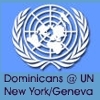

| BRIEFING - October 19, 2011 | To learn more about the Millenium Development Goals, click on the graphic Past Briefings: October 5, 2011 September 21, 2011 September 7, 2011 August 24, 2011 August 10, 2011 June 22, 2011 June 8, 2011 May 11, 2011 April 27, 2011 April 6, 2011 March 23, 2011 March 9, 2011 |
|
UN Framework Convention on Climate Change
The United Nations Framework Convention on Climate Change will be convening in Durban, South Africa next month. States and civil society members will be discussing new developments in the environment, policy recommendations, and adaptation to climate change. While most people usually consider climate change as an isolated concern, this cross-cutting issue affects a multitude of others, including gender inequality, peace and security, health, and economic development. It is imprudent to disregard the effects of climate change without first considering everything it affects. In 2008, the Commission on the Status of Women recognized “women and climate change” as an important issue to be addressed. The London School of Economics released a study after analyzing 141 countries, reporting that gender casualties are directly related to the level of economic and social rights given to women. For example, in many Asian and Latin American countries, outdoor skills such as swimming are taught to mostly boys, due to their greater social status, which allows for greater freedom of movement. Because of this, casualties caused by natural disasters are always gender-disproportionate. After the 2004 flood in Indonesia, Oxfam reported that over 70 percent of all casualties were female. Earlier, in the 1991 Bangladesh cyclones, 90 percent of the casualties were women. While gender issues might be less intuitively linked to climate change, agriculture has an obvious connection. Drought and uncertain rainfall can be the difference between life and death for rural farmers who depend on their produce for sustenance. This crop shortage problem is shared by corporations and local farmers alike. The Guardian recently reported that Starbucks has been concerned about the effects of climate change on their coffee crops including “severe hurricanes and more resistant bugs reducing crop yields.” According to the International Center for Tropical Agriculture, cocoa is also a diminishing crop due to environmental variations. The private sector is beginning to recognize climate change as a danger to resources that drive their profit. As existing natural resources dwindle due to an increasingly unpredictable climate, conflict increases as well. For example, water scarcity in the Middle East will incite fights over the existing water supplies. Resource constraints lead to economic pressures, which have a long history of exacerbating existing political rivalries. Migration due to lack of resources will also bring about conflict since competition is now greater for a lesser supply of a particular resource. Therefore, by addressing climate change in a productive manner at the upcoming conference in South Africa, many other issues could be ameliorated in the process. The Kyoto Protocol is currently the only binding international climate law in existence, and the United States is not currently a signing member. Not only should increased international environmental regulation be supported, but civil society’s awareness of climate change and its effects should also be raised. While the United Nations Framework on the Convention for Climate Change has begun this process by providing the forum for dialogue in South Africa, states and civil society must commit themselves to finding solutions in a timely manner. Climate change can no longer be considered an independent issue, but instead, a grave problem that affects every aspect of our lives.
|
Dominican Leadership Conference
Building relationships and collaborating in the mission of preaching the Gospel
29000 West Eleven Mile Road
Farmington Hills MI 48336
248-536-3234 Contact: Executive Director
 This week’s Briefing comes to you from our Dominican volunteer, Alexandra (Alex) Sajben.
This week’s Briefing comes to you from our Dominican volunteer, Alexandra (Alex) Sajben.